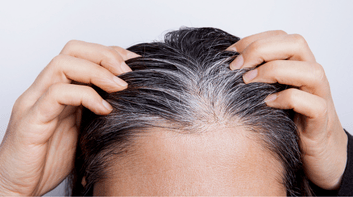
The menopause transition affects your entire body, and that includes your hair. Many women will notice thinning hair in their late 40s or 50s. Did you know that estrogen is super important for healthy, lush hair? Estrogen affects the growth cycle of your hair – it promotes hair growth and density, follicle health, and the natural oils that keep hair smooth and lustrous. So, when estrogen levels start decreasing during perimenopause & menopause, it can lead to your hair getting thinner, drier, and more brittle.
Hair loss and thinning
Starting to notice that you’re losing more hair than you used to? Estrogen has quite an impact on the growth of your hair. As you age, your follicles get smaller and produce finer strands resulting in a loss of density. Low estrogen levels also shorten the hair’s growth phase, delaying the stage when the hair regrows. For mild to moderate hair loss topical medications, like minoxidil, that promote hair growth can help. Menopause hormone therapy (HRT), that brings back healthy levels of estrogen, is very effective in treating this kind of hair loss.
Dry scalp
Estrogen also affects the levels of sebum – the natural oil that lubricates the scalp. Low estrogen leads to low sebum production, resulting in drier skin and scalp. When there isn’t enough sebum on your scalp, then there isn’t enough to infuse into your hair strands either. So your hair becomes drier, duller, and more prone to breakage. If you have a dry scalp, use gentle, hydrating hair products, and try to shampoo less often. You may also ask your doctor to recommend a specialised hair serum that will nourish your scalp without clogging your follicles.
Changes in hair texture
As you’re getting older, you may notice that your hair feels coarser or wiry. The low sebum level in your scalp is responsible for it. Besides the moisturizing oils, sebum also helps maintain hair’s pH in a healthy acidic range, which helps the cuticle cells lie nice and tight together. Lower sebum levels change the pH balance so it’s less acidic. As a result, the cuticle cells begin to lift up and pull apart, leaving hair looking dull and feeling rough. You may also notice your normally straight hair is now curly in some places. Estrogen also can have an effect on the shape of your hair follicles – changing them from circle-shaped follicles that produce straight hair to oval-shaped follicles that produce curly hair.
At home hair care treatments like an occasional hydrating mask, or a suitable nourishing serum can help treat some of these hair issues. Avoid hair-damaging activities like really hot showers, using hot styling tools too often, and harsh hair care products. HRT medications that restore healthy levels of estrogen and progesterone have been proven to be effective in treating hair loss resulting from menopause.
